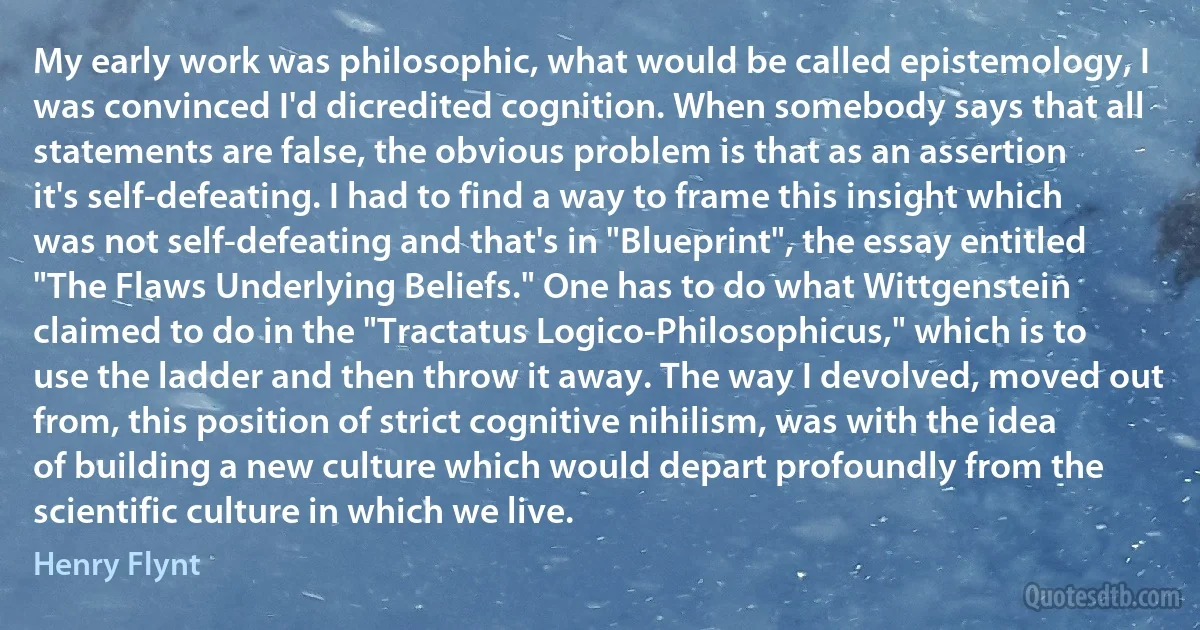
My early work was philosophic, what would be called epistemology, I was convinced I'd dicredited cognition. When somebody says that all statements are false, the obvious problem is that as an assertion it's self-defeating. I had to find a way to frame this insight which was not self-defeating and that's in "Blueprint", the essay entitled "The Flaws Underlying Beliefs." One has to do what Wittgenstein claimed to do in the "Tractatus Logico-Philosophicus," which is to use the ladder and then throw it away. The way I devolved, moved out from, this position of strict cognitive nihilism, was with the idea of building a new culture which would depart profoundly from the scientific culture in which we live.
Henry FlyntRelated topics
blueprint building cognition cognitive early epistemology essay false find frame idea ladder live nihilism position problem somebody throw use way workRelated quotes
Advances in science when put to practical use mean more jobs, higher wages, shorter hours, more abundant crops, more leisure for recreation, for study, for learning how to live without the deadening drudgery which has been the burden of the common man for ages past. Advances in science will also bring higher standards of living, will lead to the prevention or cure of diseases, will promote conservation of our limited national resources, and will assure means of defense against aggression. But to achieve these objectives - to secure a high level of employment, to maintain a position of world leadership - the flow of new scientific knowledge must be both continuous and substantial.

Vannevar Bush
Traditionally, economic analysis treats the economic system as one of the givens. The term "design" in the title is meant to stress that the structure of the economic system is to be regarded as an unknown. An unknown in what problem? Typically that of finding a system that would be, in a sense to be specified, superior to the existing one. The idea of searching for a better system is at least as ancient as Plato's Republic, but it is only recently that tools have become available for a systematic, analytical approach to such search procedures. This new approach refuses to accept the institutional status quo of a particular time and place as the only legitimate object of interest and yet recognizes constraints that disqualify naive Utopias.

Leonid Hurwicz
If you have weapons, take them home; if you do not have them, please do not seek to get them. We cannot solve this problem through retaliatory violence. We must meet violence with nonviolence. Remember the words of Jesus: «He who lives by the sword will perish by the sword.» We must love our white brothers, no matter what they do to us. We must make them know that we love them. Jesus still cries out in words that echo across the centuries: «Love your enemies; bless them that curse you; pray for them that despitefully use you.» This is what we must live by. We must meet hate with love. Remember, if I am stopped, this movement will not stop, because God is with the movement. Go home with this glowing faith and this radiant assurance.

Martin Luther King Jr.
I've lived, Sir, a long time, and the longer I live, the more convincing Proofs I see of this Truth - That God governs in the Affairs of Men. And if a sparrow cannot fall to the ground without his Notice, is it probable that an Empire can rise without his Aid? We have been assured, Sir, in the Sacred Writings, that except the Lord build the House they labor in vain who build it. I firmly believe this, - and I also believe that without his concurring Aid, we shall succeed in this political Building no better than the Builders of Babel: We shall be divided by our little partial local interests; our Projects will be confounded, and we ourselves shall become a Reproach and Bye word down to future Ages.

Benjamin Franklin
It is one of the most beautiful characteristics of Theosophy that it gives back to people in a more rational form everything which was really useful and helpful to them in the religions which they have outgrown... in this teaching as to the immortality of the soul and the life after death, Theosophy...does not put forward these great truths merely on the authority of some sacred book of long ago; in speaking of these subjects it is not dealing with pious opinions, or metaphysical speculations, but with solid, definite facts, as real and as close to us as the air we breathe or the houses we live in - facts of which many among us have constant experience - facts among which lies the daily work of some of our students, as will presently be seen.

Charles Webster Leadbeater
